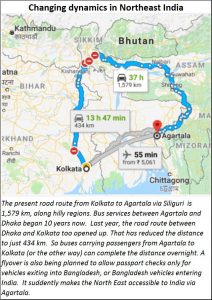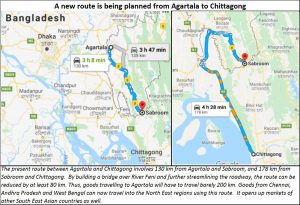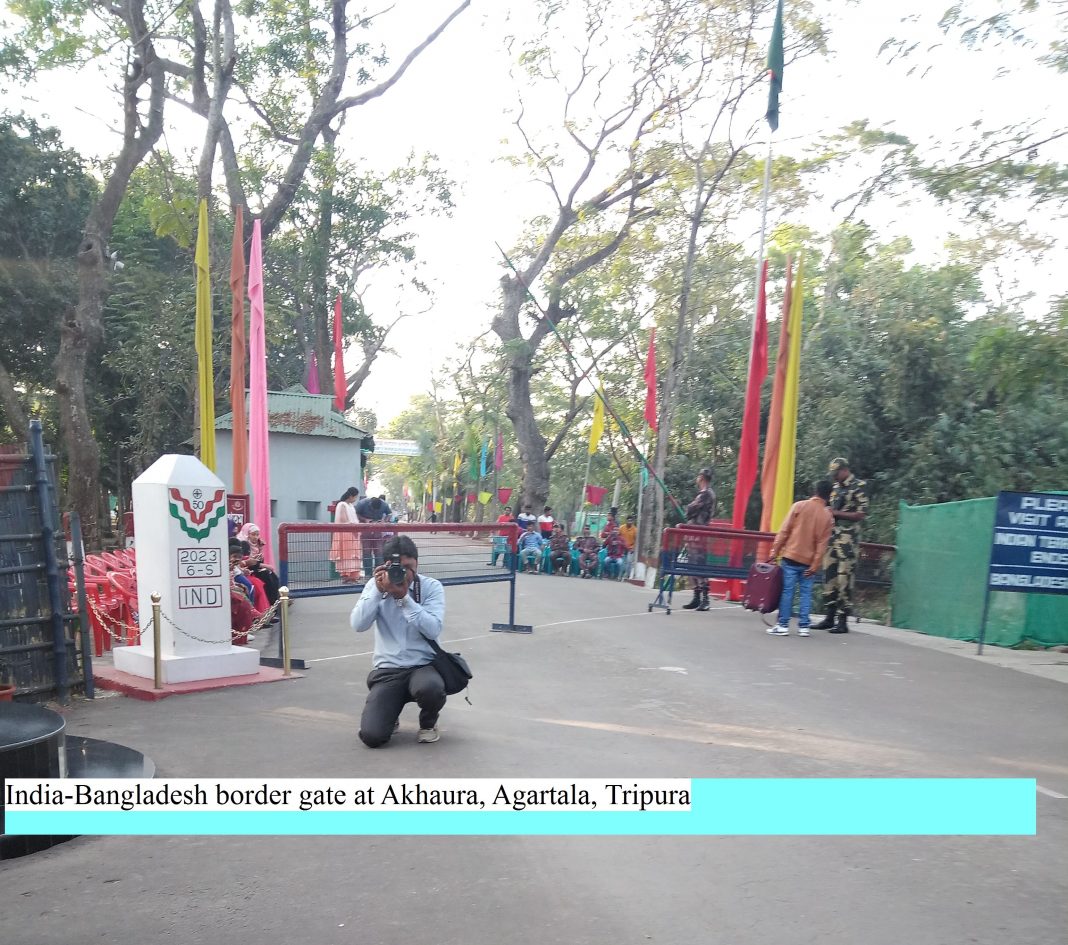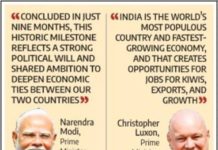https://www.moneycontrol.com/news/business/economy/agartala-on-its-way-to-becoming-a-major-hub-for-trade-and-commerce-3556891.html
Moneyconrol
Agartala in Tripura could become a major hub for trade, commerce, even defence
The government of India – in conjunction with the state government of Tripura – is working hard to complete the bridge over River Feni near Sabroom.
RN Bhaskar — Feb 19, 2019
 Four years ago, Agartala was a sleepy town. Yes, it is the capital of the state of Tripura. And yes, it does figure in the news sometimes. But four years ago, it was too big to be called a village. Too small to be called a city. It was at best a town, but an underdeveloped one at that.
Four years ago, Agartala was a sleepy town. Yes, it is the capital of the state of Tripura. And yes, it does figure in the news sometimes. But four years ago, it was too big to be called a village. Too small to be called a city. It was at best a town, but an underdeveloped one at that.
But now, you see many cars on the roads; traffic jams are not uncommon. The airport is being upgraded to touch Bangladesh’s border (it is quite possible that an immigration gate could get opened here too in addition to the existing one). A few malls have begun to make their presence felt in the town. But it has yet to catch up with most state capitals in the country. Hotels are still a bit primitive – there is not a single five- (or even four-) star hotel in the city.
But the roads are good. And the first signs of this city becoming a major tourist destination are visible. Its sanctuaries are being spruced up, with some of the best facilities any tourist centre could boast of. Its lake palace – akin to Jaipur’s famous lake palace – looks gorgeous.
But more important than these signs are the measures that are being taken – not yet reported in mainstream media – that could make Agartala the trade hub for almost all of North East India, and possibly for this entire Asian region as well.
To understand why the change is taking place, it is important to look at two maps. The first map shows how – for the past 70 years — access to the North East always depended on what is commonly referred to as the Chicken’s Neck. The Doklam crisis highlighted India’s vulnerability like never before.
Fortunately, even earlier, some measures had been embarked upon. In 1999, both India and Bangladesh agreed to start a bus service between Kolkata and Dhaka. This was further extended to another route between Dhaka and Agartala in 2001. By 2008, this connectivity was further bolstered by reviving an old rail link between Kolkata and Dhaka. The present government is in the process of extending this rail link by connecting Dhaka and Agartala.
Plans include a highway from Kolkata to Agartala which would allow transportation between the two cities without bothering about passports and visas (the present road and rail links will have to go through passport and immigration controls). Exit points for Dhaka will support immigration and customs controls. Already, the road, rail and the proposed highway have reduced the existing road link between Kolkata and Agartala from around 1579 km to just 434 km – but subject to immigration and customs checks.
 But something bigger is now happening. The government of India – in conjunction with the state government of Tripura — is working hard to complete the bridge over River Feni near Sabroom. A bit of road extension from there will allow traffic from Agartala to reach Chittagong reducing the current route of around 300 km to just around 200 km.
But something bigger is now happening. The government of India – in conjunction with the state government of Tripura — is working hard to complete the bridge over River Feni near Sabroom. A bit of road extension from there will allow traffic from Agartala to reach Chittagong reducing the current route of around 300 km to just around 200 km.
It is this route that is likely to convert Agartala into a major trading centre for not only the North East, but also this Asian region.
Chief minister Biplab Kumar Deb is emphatic that the Feni bridge will get completed before December 2019. Goods will now flow from Chittagong to the entire North East.
Defence sources are also ecstatic. Without willing to go on record, a senior officer of the defence sources confessed that his route will become more important for army and related supply movements from India to the North East through Chittagong and Agartala.
River routes are also being developed. A jetty is being built at Sonambra, That will allow small ships (each capable of carrying load equivalent to that of 50 trucks) to travel up the Mahanadi River into the (North Eastern) Gomti River. One of the biggest beneficiaries will be Mizoram, next door neighbour, which is also landlocked. Over the next few years, river routes are likely to gain popularity over the road and rail routes because of two reasons.
First, the entire North East is full of rivers. Each river touches villages and towns that are important consumption centres. Hence river transport will reach out to more people than rail or road will. Second, river transport will invariably be cheaper than road or rail transport (http://www.asiaconverge.com/2016/11/india-waterways-a-gamechangerrobust-water-transportation-can-help-india-drastically-cut-freight-costs/). Expect this to develop further in the coming days.
These linkages will soon transform Agartala into one of the biggest commercial hubs in this part of the world. Reason: almost everything that comes into Tripura for daily consumption is imported from other parts in the region. Take rice (the non sticky, usually Basmati variety) is brought into the state from Siliguri, and so are vegetables. And milk. Plans are afoot – thanks to the work done by Central government ICAR (Indian Council for Agricultural Research) in partnership with the state government to get farmers to grow such crops and develop animal husbandry, including fishing. Thus, the costs associated with the long, winding route from Siliguri should disappear. And as the state gears up to export rice, vegetables and milk, the road ad water linkages with Chittagong will entirely change trade logistics.
Secondly, the chief minister is already making moves to wean away the 85,000 Bangladesho trek into India each year to seek out medical treatment. They travel from Agartala – using the checkpost in this city as a major crossover point, and travel to Kolkata or to other parts of India. The state has already begun negotiations with mahor hospital chains in India to take over the lagest state owned hospital and convert it into a super-speciality medical centre – without giving up its function as a primary health care center. The state hopes to be a big-time player in the medical tourism business soon.
Many more moves are on the cards, which shall be discussed later. For now, the unlocking of routes for this land-locked state – surrounded by Bangladesh on three sides — will rapidly convert Agartala into one of the biggest business centres in the region.
The markets will be watching developments very closely.










































COMMENTS